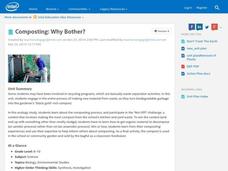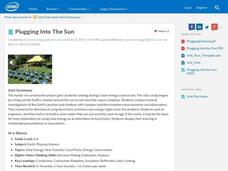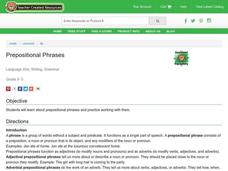Curated OER
Voices from Little Rock: Understanding the Civil Rights Movement through Primary Sources
As part of a study of the Civil Rights Movement, class members examine documents associated with the Little Rock Nine, the Brown v. Board of Education ruling, the 14th and 15th Amendments to the US Constitution, and chapters from Melba...
Curated OER
Unit 1: Building Historical Background Knowledge: The Road to Revolution 1754–1776
What were the conditions that led to the American Revolution? What are the conditions that lead to revolution in other times and places? Class members examine primary source materials and use evidence drawn from these documents to craft...
National Wildlife Federation
Why All The Wiggling on the Way Up?
Some of the CO2 emitted by burning fossil fuels is removed from the atmosphere by natural sinks, such as the ocean. The fifth engaging lesson in the series of 21 examines the CO2 data from three very different locations. It then makes a...
Intel
Composting: Why Bother?
The first STEM lesson in a group of 10 explores composting. After discussing how to make a better tomorrow, classes are challenged to track garbage in their communities, visit a local waste management facility, and conduct a survey about...
Intel
Insects: The Good, The Bad, The Ugly
What would the world be like with no insects? Ponder this question using a research-based STEM unit that encourages scholars to investigate insects from both a beneficial and hazardous perspective. They learn about insect behaviors,...
Intel
Starquest
Almost every ancient culture observed the stars and saw pictures in the patterns. Studying stars allowed them to guide travelers, determine when to plant crops, when to harvest food, and the stories surrounding the images include some of...
Intel
Forensics: Get a Clue
Although the methods are all scientific, forensic science was started by police officers rather than scientists, who relied on observation and common sense. Young detectives use many tools to solve crimes around the school in a...
Intel
Plugging into the Sun
What's cooking? A sizzling STEM unit challenges scholars to build a solar cooker that can successfully cook an egg. The unit opens with a study of Earth's rotation, the sun's energy, and shadows. Pupils use a compass and thermometer to...
Carolina K-12
Exploring the Electoral College
Does your vote really count? This activity helps young voters learn about the electoral college through a TED talk, a helpful handout, discussion prompts, and then a role-playing activity that has participants simulating an election on a...
Towson University
Mystery Disease
How did scientists determine the cause of illness before technology? Science scholars play the role of medical researcher in an engaging guided inquiry activity. Using observations, technical reading, and Punnett squares, learners...
Cornell University
Energy Changes in Chemical Reactions
The heat of solution measures how much thermal energy a dissolving substance consumes or gives off. The experiment demonstrates both endothermic and exothermic reactions. Scholars dissolve several substances, measure the temperature...
Queen's Printer for Ontario
Evaluating Wartime Posters: Were They Good Propaganda?
"Back Him Up!" Scholars will analyze how World War I posters displayed, on the home front, often attempted to stir up emotions. As they examine the different ways people used propaganda posters during the war, they will create their own...
Annenberg Foundation
Slavery and Freedom
How do nineteenth-century texts by African American and Native American writers contribute to the country's ideals of freedom and individuality? Learners explore the topic by watching and discussing a video, reading biographies, writing...
K12 Reader
Nouns as Adjectives
Sometimes nouns can do the work of adjectives! Young language arts pupils analyze ten noun phrases and determine which contain adjectives, and which contain nouns that describe other nouns.
Curated OER
Prepositional Phrases
There are two types of prepositional phrases: adjectival and adverbial. Gather teaching strategies from this resource to give your learners lots of practice and meet Common Core standards! First, review prepositions by providing a...
Hawaiʻi State Department of Education
Poems That Dance
Combine the elements of dance with the actions in a poem. Learners review basic grammar, write an action-packed cinquain poem, and then choreograph a dance based on their cinquains. After the dances are done, they'll discuss the elements...
Core Knowledge Foundation
Genetics and the Master Race
How did the beginnings of genetic research influence the Nazi party? A thorough, engaging unit incorporates the work of Gregor Mendel, the study of inherited traits, and the use of racism and discrimination during the Holocaust.
Curated OER
English Basics: The Jargon You Need to Know
These functional slides first show a list of parts of speech then a few sentences. In each subsequent slide, nouns are first highlighted, then pronouns on the next slide, and articles on the next slide, all using the same basic...
Curated OER
Impact Craters Activity
Lunar explorers perform an experiment to understand the size of the craters on the surface of the moon. They layer flour, laundry detergent, and cocoa powder in a pan to model the lunar surface. They drop marbles from different heights...
Maryland Department of Natural Resources
Eyes on Dissolved Oxygen
Learn about the factors that affect the way oxygen dissolves in salt water with a chemistry lab. After studying the molecular structure of water, young scientists figure out how aeration, temperature, and organic waste affect dissolved...
Curated OER
Appositives and Present Participle Phrases (-ing word groups)
Combine sentences with the help of this grammar resource! Learn how to combine sentences using appositives and present participle phrases. The first page focuses on combining two sentences and creatine one. On page two, writers practice...
Curated OER
Subject and Predicate
Give your class foundational skills by teaching them how to identify the subject and the predicate of a sentence. Walk them through the information on the top of page one, and then let them complete the practice opportunity...
Curated OER
Phrases and Clauses
Clarify the different types of phrases and clauses that young writers can use to vary their sentence structure. A helpful slideshow presentation encourages your class to fix sentences by adding more interesting phrases and clauses,...
Biology Junction
World of Insects: Characteristics, Orders, and Collecting
Every bug is an insect, but not all insects are bugs. A presentation lists the characteristics of insects, describes their body parts, and explains metamorphosis. It also details every order and includes photographs and multiple facts...
Other popular searches
- Misplaced Modifiers
- Dangling Modifiers
- Dangling Misplaced Modifiers
- Modifiers Intensifiers
- Identify Dangling Modifiers
- Modifiers in Grammar
- Pronouns and Modifiers
- Teaching Misplaced Modifiers
- Using Comparative Modifiers
- Choosing the Correct Modifier
- Modifier Placement
- Grammar Dangling Modifiers

























